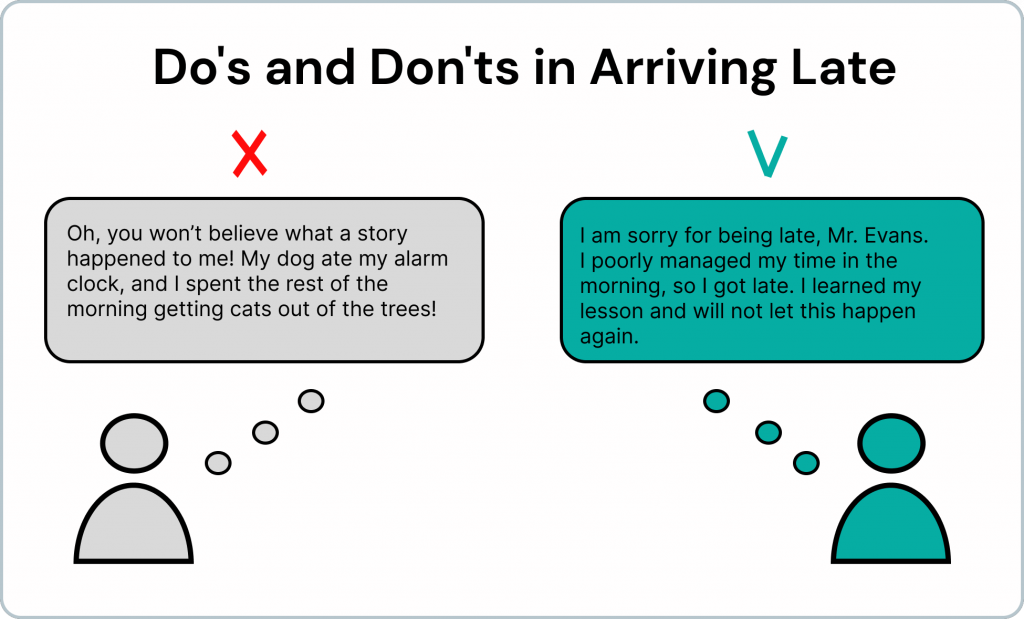Sooner or later, each student has the guilty pleasure of doing something fun or just oversleeping, which leads to arriving late to class. However, in some cases, you simply cannot let that happen. Some professors easily forgive such mischief, but some definitely do not. If you understand that you’ve been working on your business law dissertation topics all night and now there is no help for arriving late, at least you can do it right. Here are some tips on how not to get adverse treatment for the rest of the term.
What to Do If You’re Late
Okay, there is a chance that you are not reading this while hurriedly running to class but instead while preparing in advance for such emergencies. In this case, the best method is to ask professors what you should do if that happens.
Learn in advance what your behavior should be in such cases
Talk to your professors and explain that you will do your best to get to class on time but want to know the plan for emergency cases. Some professors prefer that you quietly get into a vacant seat, and some would rather greet you and have a word or two on the reason for your late arrival. It is better to remember which is which, so you can correct your behavior depending on the class you are going to.

Speak to the professor or your classmates after the class
If a significant amount of time (about half an hour) has passed, you could have missed important announcements, tasks, or critical ideas for the following classes. Figure out what was missed after the class so that the harm to your studying will be neutralized. Also, this will show the professor that your lateness was an unfortunate accident rather than your deliberate decision. Suggest them to do some extra assignment as an exuse for being late to the class: a what to know about dreams essay could be a nice option, don’t you agree?
In Japan, especially in public transport, we have almost a worship of punctuality. There was a case recently when a train driver had to step out for natural reasons, which caused only a one-minute lateness. However, it was made into a complete public investigation.
Akari Saito, Marketing student
Consider skipping the class
Disclaimer: this one is for emergency cases only, not regular usage. Yet, if you have already missed more than forty percent of a class, arriving to class that late is more impolite than skipping it. First, it makes no sense for the purpose of your education; you have missed the crucial part. It will be easier to ask a classmate to explain the whole thing to you after the class. Second, while five to ten minutes are sometimes acceptable degrees of lateness, half an hour is definitely not. If you can join the class online, go ahead and use some Zoom apps for education.
Do not go the extra mile making excuses for being late to school
If the teacher asks why you are late, answer honestly. You can find many virtuous excuses in free access, but honestly, that will make you look rather like a child. A grown-up person takes responsibility for their mistakes and learns from them. Acknowledging your mistake will earn you more respect than trying to cover your bad.
Instead of coming up with excuses, you better answer honestly and apologize. Don’t place emphasis on how badly you tried to avoid being late, because anyway, your attempts did not succeed. Instead, say that the lesson has been learned and that it will not happen again.

What NOT to Do
Now, you should also know the written and default rules one must never dodge while coming late for class. If the recommendations on how to avoid being late do not work out for you, stop for a second. Never break into the classroom without planning your behavior – a careless entrance may cause more trouble than simply being late.
Do not make it a show; get quietly into the classroom
If you are in a rush and short of breath, take a moment before entering the classroom. Some students think vividly showing how much they hurried up will cause a lighter attitude. It is not true; you will rather interrupt the lesson and irritate the professor more. Here are some options that may be suitable for coming in late for school in different circumstances:
- Lecture-Style classes. When entering a lecture, go directly to the empty seat and try to cause little to no distraction from the lecturer’s story.
- Laboratory classes and group work. In a laboratory class, determine where the teacher is standing and consider whether it is polite to go to them at the moment. If the teacher is busy speaking to your classmates, wait until they are done and ask who you can join (if the laboratory involves working in pairs or groups)
- Studio-style college courses. If you have studio-style college courses, make sure not to go between the other students and the main object of the lesson. For instance, in art classes, students may be tasked with painting an object from nature. Going between this object and other students will interrupt their work and may damage the result.
- Independent study. If you are in the third or fourth year of your bachelor’s degree or on the master’s one, you may have more personal assignments and projects. In such cases, the student usually has a mentor for the research project. If you understand that you are coming late to class, call or message the mentor and notify them about the issue.
- Online classes. Compared to other types of classes, the consequences for tardiness in school while online aren’t that heavy. However, it depends on whether the lecturer has to approve each student in the Zoom waiting room individually. In both cases, enter the meeting and consider a short apology in the shared chat.
Do not make your lateness someone’s else responsibility
Undoubtedly, there are situations where you are late for the class because the traffic is really heavy or because your relatives need extra help from you. The sad news is that whatever the reasons are, your class is not the right place to complain about it, and your professor or teacher is definitely not the right person for such frankness. The advice is not to keep the emotions within yourself, but to release them with the right people around you and in the right place.
Your main task is to demonstrate respectfulness. Make sure to consider what respectfulness is in particular circumstances.
Do not demand anything you missed
That is quite an obvious rule, but it is worth repeating anyway. When entering the class late, some students try to catch up on the material they missed immediately. Such behavior is understandable, as they care about being on equal footing with the rest of the class. However, if you ask somebody nearby about the topic or what you missed, the explanations will interrupt the lecturer. As a result, both of you will lose the information the lecturer is sharing at the moment. More harm is done than prevented.
Tips on How to Avoid Being Late for Classes
Regardless of whether you are already late or preparing in advance for emergencies, some other tips can save you grade points and nerves. Go through the following checklist and find out how prepared you are for a similar case:
- Have a taxi app on your phone. This article’s number-one rule is to avoid being late, if that is still possible. You should have a taxi app on your phone for an emergency case and some cash on the card to make it work. It will help you if the problem is solely based on transportation, and in general, you can possibly make it precisely to the start of the class.
- Regulate your evening and morning routines. The primary reason for chronic lateness is chaos and inconsistency in your actions. Make sure you finish your 500-word essay example before it’s the last minute, or that you learn how to write an analytical essay in advance. Set clear habits for your morning routine; waking up and preparing for classes will be much more pleasant.
- Set a few alarms. The chances are that you may sleep so soundly that you will not hear the first alarm clock. The second and third ones are more likely to complete the mission, especially with the customized increasing loudness.
You Should Read It: Funny Stories About Being Late
Coming in late for class is not the end of the world, and it usually does not have as severe consequences as cheating or not passing an exam. That is why there is always a story or two we can all joke about. Here are two such stories.
Xiu Chang, being in a Barbie trend before it was a mainstreamI personally never had extra funny stories about being late. Of course, I was late in a few cases, but nothing that got out of hand. The funny story happened to one of my classmates, who also was not used to late arrivals. He arrived 20 minutes after the start, but the professor let him in and continued the lecture. The topic was “Personal Brand in Marketing”, and soon after the classmate (feeling guilty for being late, I suppose) volunteered to improvise a presentation on how to introduce yourself through your appearance. He was deadly serious about presenting his points and made an impression. The only issue was that when he took the jacket off, his sister’s T-shirt was underneath with a large Barbie print on it. They are approximately the same size, and he had taken the first thing from the clean laundry and prepared to iron whatever came to hand, without anyone looking at it. |
Cristel: The child’s perspectiveInterestingly, children perceive “being on time” with their own criteria. My son Louis is six, and he does not understand how I can be late for night shifts in the store when most people are asleep. He knows I am organizing merchandise at night, so when I say that I am hurrying up so as not to be late, he often jokingly says something like, “Does the store have a watch, Mom? He has eyes and will scold you?”. Then he starts mimicking a serious boss-looking tuna can or cucumber with a clock on the wrist. Well, sometimes I come in late for work, but at least I do it with a smile on my face. |




